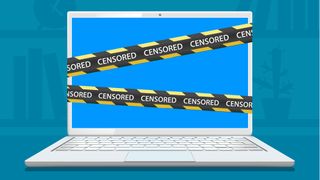The pandemic has been an absolute disaster for internet freedom worldwide
Covid-19 has given political bodies an excuse to crack down on internet access

The level of online freedom enjoyed by internet users worldwide has taken a significant hit during the pandemic, new research has found.
According to digital rights champion Freedom House, political leaders across the globe have used the pandemic to drive forward surveillance agendas and limit access to information and services online.
Covid-19 is also said to have lent an air of legitimacy to mass data gathering initiatives, which were hurried through without proper scrutiny due to the urgency of the public health crisis.
- Check out our list of the best VPN services around
- We've built a list of the best web proxies out there
- Here's our choice of the best secure routers on the market
“The coronavirus pandemic is accelerating a dramatic decline in global internet freedom,” warned Adrian Shabaz and Allie Funk of Freedom House in a blog post.
“State and nonstate actors in many countries are now exploiting opportunities created by the pandemic to shape online narratives, censor critical speech and build new technological systems of social control.”
As expected, internet access in China and Iran remains the most highly restricted, but countries such as India, Myanmar and Kyrgyzstan suffered the steepest decline over the past twelve months - and even the US has fallen in the internet freedom index.
Internet restrictions
According to Freedom House, the overall level of freedom on the internet has declined now for ten consecutive years - but took an especially severe nosedive in 2020.
Are you a pro? Subscribe to our newsletter
Sign up to the TechRadar Pro newsletter to get all the top news, opinion, features and guidance your business needs to succeed!
The report suggests the pandemic combined with the US-China trade war and wider shift towards cyber sovereignty to create a perfect storm for the deterioration of internet liberties.
“Authorities cited the pandemic to justify expanded surveillance powers and the deployment of new technologies that were once seen as too intrusive,” said Shabaz and Funk.
“But the rapid and unchecked rollout of these tools presents an immense risk to privacy, transparency and broader human rights. And these surveillance systems would be remarkably difficult, if not impossible, to decommission.”
This year, the digital rights watchdog also observed intentional disruptions to internet connectivity in a record 22 out of 65 countries monitored, many of which were directly linked with political unrest in the offending nations.
Even the United States - traditionally considered a bastion of internet freedom - fell by one index point, and has now declined for four years running under Donald Trump's primacy.
An example of the country’s more stringent stance can be seen in the executive order, issued by Trump in August, that banned US entities from transacting with Chinese businesses TikTok and WeChat.
VPN usage soared in the country following the announcement, demonstrating the unwillingness of US citizens to suffer intervention from the state in internet-related freedoms.
“There is tremendous value to an internet that is open, free and global. Even in settings that are otherwise highly oppressive, an unrestricted online space offers immeasurable possibilities for free expression, community engagement and economic development,” added Freedom House.
“If digital communications platforms are to advance the cause of human rights in the 21st century, the internet freedom movement must build robust governance structures that enshrine and enforce [internet] protections.”
- Here's our list of the best business VPN services right now

Joel Khalili is the News and Features Editor at TechRadar Pro, covering cybersecurity, data privacy, cloud, AI, blockchain, internet infrastructure, 5G, data storage and computing. He's responsible for curating our news content, as well as commissioning and producing features on the technologies that are transforming the way the world does business.
